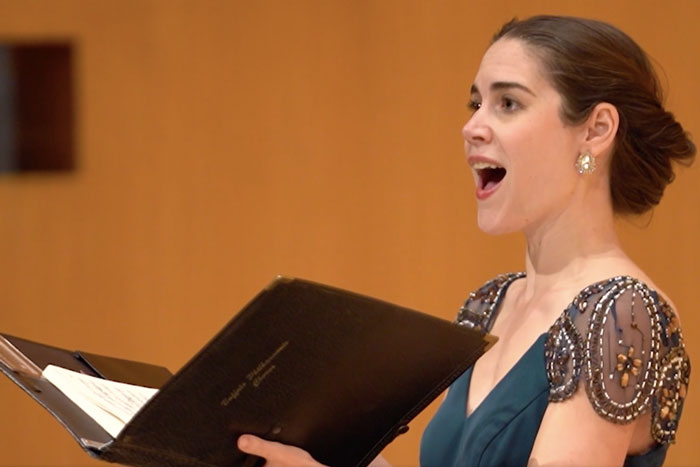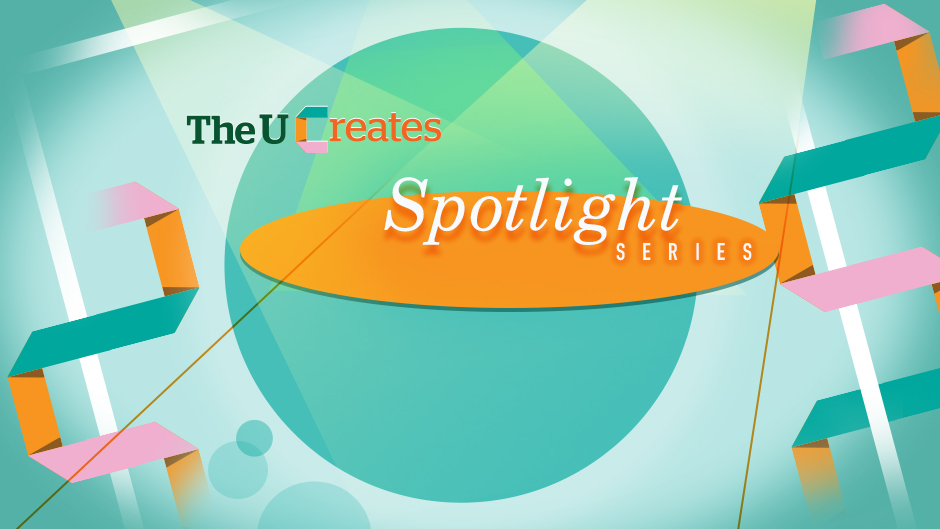The U Creates continues a series focused on highlighting members of the University’s creative community.
In this “Spotlight” feature, meet Madeline Harts, a Frost School of Music doctoral candidate.

Tell us about yourself: your background, major, graduation year, and interests?
My name is Madeline Harts, and I am a soprano and voice instructor originally from Buffalo, New York. I am a third-year doctoral candidate in the Doctor of Musical Arts in Vocal Pedagogy and Performance program at the Frost School of Music. I expect to graduate from the University of Miami this spring, May 2021.
What inspired you to pursue music?
I do not remember a time when music was not a part of my life. It has always been there as an outlet of joy or a form of support through difficult times. My parents gave me the gift of music when I was a child in the form of piano lessons, musical movies playing repeatedly on the box TV, and singing in the backyard. The more I was exposed to music, the more I loved it. And my favorite times were sitting at the piano, playing and singing for the family. Making music, singing or playing notes that were once only dots on a page, made me feel like I was breathing life into the world. These experiences engrained themselves in me and, more than that, made me want to share this gift with others through performance and education. It led me on a vocal performance and education career path, and I never looked back.
What drives your creative spirit?
My creativity is driven by expression and sharing. It has always been this way, oddly enough. Just like music was a constant, so too was the desire to encourage and help others experience that same exhilaration of the arts. In this way, I knew that I also wanted to teach. There is nothing that gives me more joy than to watch students find success and discover their voices for the first time. Even in performance, whether it be on the operatic stage or in a recital setting, sharing song with an audience is one of the most fulfilling feelings—in what other way can you lift people up and give permission to experience emotion? Music is an escape from daily life for a lot of people. It is a privilege to call myself a musician.
How do you stay inspired during the pandemic? What is something you are working on this year that you would like to share?
When the pandemic first started, it seemed as though the world had been pulled out from under our feet—not just mine, but the entire musical community. The thought of not performing or teaching in person was heartbreaking, especially for singers. Covering the mouth and face has quite literally meant losing connection to the voice for fear of spreading droplets. As a consequence, the entire concept of “live performance” needed to be altered.
But the thing about artists is that creativity will always find an outlet. We are so lucky to live in a time where technology can facilitate communication as well as it does—in audio and video. During the pandemic, I have been teaching students from all over the United States online, some of whom I would not have seen for long stretches of time because of distance. I have also sung a tele-broadcast concert with the Buffalo Philharmonic, am singing and playing in all-virtual choirs and orchestras, and I just recently broadcast a virtual lecture-recital for my doctoral degree. For as long as COVID-19 lasts, I know that I will continue to find new ways to teach and make music with peers and colleagues.
Currently, my primary project is working on my doctoral thesis, which brings to light the accomplishments of two female pedagogues (teachers) of voice who have been lost to history’s pages. This is a topic I am passionate about acknowledging and celebrating women’s work in music, most of which has gone unnoticed for far too long. I will also be recording some acapella compositions by fellow Frost DMA student Ryne Siesky, and I am planning a virtual recital featuring Hebrew and Yiddish art song, another love of mine. Stay tuned via my website: https://madelineharts.com.
What are your proudest achievements?
By far, my proudest achievement has been attending the Frost School of Music for my doctorate in music and the opportunities that have been awarded me during my time here. While at Frost, I have sung starring roles in operatic productions and was awarded a scholarship to attend the Patti and Allan Herbert Frost School of Music Salzburg Program, where I was a winner of the Mirabel Voice Competition. I am also honored to have been the recipient of the Presser Foundation’s Graduate Music Award last year and will conduct research at Harvard and the British Library in London this coming summer on female vocal pedagogues—this will culminate in a recording project. I count myself incredibly fortunate; these are achievements I will carry with me throughout my career.
What are your future goals and how do you hope Frost can help you achieve them?
My goals are in progress! I am currently submitting applications to be a professor of voice at a university, and I am continuing to teach aspiring singers to find their voices with excitement and enthusiasm. I also aim to continue to sing and make music while maintaining an active research presence in the vocal pedagogy community. Vocal habilitation is a field that is on the rise, helping singers who have suffered vocal trauma once they are back in the voice studio. And I want to make an impact.
Frost has helped me achieve so much during my time here. It has been an experience unlike any I had imagined. I hope that they might have me back one day so that I can give to them what they have given me: the gift of music.

